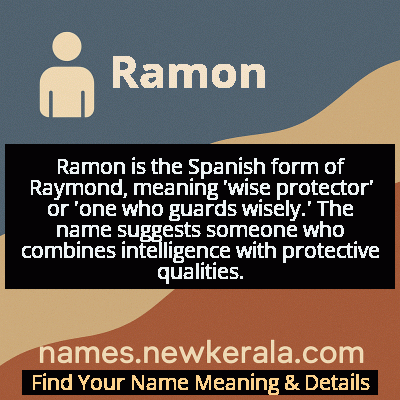Ramon Name Meaning & Details
Origin, Popularity, Numerology Analysis & Name Meaning of Ramon
Discover the origin, meaning, and cultural significance of the name RAMON. Delve into its historical roots and explore the lasting impact it has had on communities and traditions.
Name
Ramon
Gender
Male
Origin
Spanish
Lucky Number
7
Meaning of the Name - Ramon
Ramon is the Spanish form of Raymond, meaning 'wise protector' or 'one who guards wisely.' The name suggests someone who combines intelligence with protective qualities.
Ramon - Complete Numerology Analysis
Your Numerology Number
Based on Pythagorean Numerology System
Ruling Planet
Neptune (Ketu)
Positive Nature
Intuitive, analytical, spiritual, and inquisitive.
Negative Traits
Secretive, reserved, aloof, and can be overly critical.
Lucky Colours
Green, yellow.
Lucky Days
Monday.
Lucky Stones
Cat’s eye, moonstone.
Harmony Numbers
1, 5, 6.
Best Suited Professions
Scientists, researchers, spiritual leaders, detectives.
What People Like About You
Depth of knowledge, analytical skills, spirituality.
Famous People Named Ramon
Ramon Llull
Philosopher and Theologian
Major figure in medieval philosophy, wrote the first major work of Catalan literature
Ramon Magsaysay
Politician
Seventh President of the Philippines, known for his integrity and service to the people
Ramon Novarro
Actor
Mexican-American silent film star and one of the first Latin American actors to succeed in Hollywood
Ramon Fonst
Fencer
Cuban fencer who won multiple Olympic gold medals, considered one of the greatest fencers in history
Name Variations & International Equivalents
Click on blue names to explore their detailed meanings. Gray names with will be available soon.
Cultural & Historical Significance
Throughout Hispanic communities worldwide, Ramon has maintained its traditional appeal while evolving to represent modern values of strength, intelligence, and reliability. The name appears frequently in literature, politics, and the arts, often given to characters or individuals who embody leadership and wisdom. In many Spanish-speaking families, naming a son Ramon honors ancestral connections while expressing hopes for the child's future character. The name's enduring presence across generations demonstrates its ability to adapt while maintaining its core significance as a name denoting protection and wisdom.
Extended Personality Analysis
Individuals named Ramon are often perceived as possessing a natural wisdom and protective nature that aligns with the name's meaning. They tend to be thoughtful decision-makers who approach situations with careful consideration and foresight. Many Ramons exhibit strong leadership qualities combined with a genuine concern for the well-being of others, making them natural guardians in both personal and professional contexts. Their analytical minds allow them to assess complex situations effectively, while their inherent sense of responsibility often positions them as reliable figures in their communities.
While they can be reserved in unfamiliar settings, those who know them well appreciate their depth of character and unwavering loyalty. The combination of intellectual curiosity and protective instincts creates individuals who are both capable problem-solvers and dependable companions. Ramons often display patience and perseverance when facing challenges, preferring methodical approaches over impulsive actions. They tend to value tradition and stability while remaining open to new ideas that align with their ethical framework. This balance of conservative values and progressive thinking makes them effective mediators and trusted advisors in various social and professional circles.
Modern Usage & Popularity
In contemporary times, Ramon maintains steady popularity throughout Spanish-speaking countries and communities. While it may not rank among the top 10 most popular names in many regions, it remains a classic choice that parents select for its traditional roots and meaningful connotations. The name has seen some decline in recent decades as more modern or international names gain popularity, but it continues to be respected as a strong, masculine name with historical depth. In the United States, Ramon has maintained consistent usage among Hispanic families while also being adopted by non-Hispanic parents seeking a name with European heritage. The name's versatility allows it to work well in both formal and casual contexts, and its recognizable pronunciation across multiple languages contributes to its enduring appeal. Recent trends show that while fewer parents are choosing traditional Spanish names like Ramon for their children, those who do often value the name's rich cultural heritage and timeless quality.
Symbolic & Spiritual Meanings
Symbolically, Ramon represents the archetype of the wise guardian or protector. The name carries connotations of intellectual strength combined with physical or emotional protection, suggesting someone who defends through knowledge and foresight rather than mere force. It symbolizes the balance between thought and action, where careful consideration precedes decisive movement. In metaphorical terms, Ramon embodies the concept of the 'philosopher-king' ideal – someone who rules or leads through wisdom and ethical consideration. The name also suggests reliability and steadfastness, much like a fortified structure that provides shelter and security. In spiritual contexts, it can represent the guardian of tradition or cultural values, someone who preserves important knowledge while adapting it to contemporary needs. The symbolic meaning extends to represent the bridge between past and future, honoring heritage while thoughtfully navigating modern challenges.

